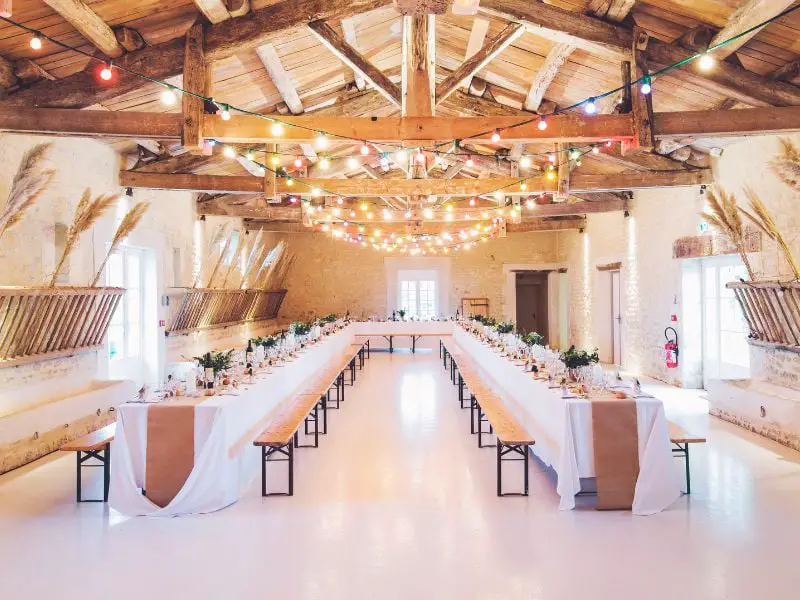In recent years, I’ve noticed a growing trend in the event planning industry: sustainable events. These eco-friendly gatherings prioritize the environment and seek to minimize their impact on our planet. This article will delve into some of these sustainable event ideas and learn how they can positively impact our environment.
Sustainable Event Ideas
Planning a sustainable event is a great way to reduce environmental impact and create a memorable experience for your guests. In this section, we will share some of our favorite ideas for making your event more eco-friendly, focusing on eco-friendly venues, green catering, waste reduction, transportation, and travel.
1. Eco-Friendly Venues
Choosing a green event venue is essential to planning a sustainable event. Look for venues that have sustainability certifications and actively work to meet sustainability guidelines and benchmarks. These venues typically implement environmentally friendly practices, such as water conservation, energy efficiency, and waste reduction.

2. Green Catering
Food and beverages play a significant role in your event’s sustainability. Consider partnering with eco-conscious caterers who focus on locally-sourced and seasonal ingredients. Moreover, minimize food waste by offering reasonable portions and donating any leftover food to local shelters or food banks.

3. Waste Reduction
Reducing waste at your event should be a top priority. Encourage guests to bring their reusable items, such as water bottles and utensils. Replace single-use products with reusable or biodegradable options, like bamboo plates and compostable cups. Set up clearly labeled recycling and compost bins to ensure proper waste disposal.

4. Transportation and Travel
Promote eco-friendly transportation alternatives for your guests, such as public transit, carpooling, or biking. If your event has out-of-town attendees, recommend nearby accommodations within walking distance of the venue or easily accessible by public transportation. For a more personalized touch, consider organizing group transportation options for guests, like a shuttle bus or shared rides.
By carefully considering these aspects, you can plan a sustainable and memorable event for all attendees.
Implementing Sustainability in Event Planning
The importance of sustainability in the industry includes making conscious choices in selecting suppliers, communicating the importance of sustainability to attendees, and tracking the environmental impact of events.
Selecting Suppliers
First and foremost prioritize working with vendors with a solid sustainability commitment. This involves choosing local suppliers to reduce transportation emissions and sourcing eco-friendly materials for event decor. For example, you opt for recycling materials and reducing waste whenever possible. Additionally, you can inquire about their energy efficiency policies, practices, and certifications.
Communicating Sustainability to Attendees
It is vital to share the sustainable vision of the event with attendees from the get-go. You can include information about the eco-conscious aspects of the event on invitations, social media, and event websites. By showcasing our greener choices, attendees can appreciate the efforts put into reducing the event’s carbon footprint. Providing tips on reducing personal waste, such as bringing reusable water bottles and encouraging carpooling, also drives home the sustainability message.
Tracking Environmental Impact
The responsibility of a sustainable event planner extends beyond the event itself. Measuring and tracking the environmental impact is essential to make data-driven decisions for future events. This means closely monitoring the waste generated, energy consumed, and carbon emissions throughout the event. With accurate data, you can learn and adapt to deliver even more planet-friendly events in the future.
Benefits of Sustainable Events
In this section, we’ll discuss the benefits of organizing eco-friendly gatherings, including Cost Savings, Brand Image Enhancement, and Positive Social Impact.
1. Cost Savings
A great aspect of sustainable event planning is the potential for cost savings. By utilizing strategies such as energy efficiency, waste reduction, and sourcing local goods and labor, you can minimize expenses while reducing carbon footprints. For example, opting for reusable or recyclable materials can save money in the long run by avoiding the need to purchase single-use items continuously. Additionally, sourcing local goods and services can reduce transportation costs and support the local economy.
2. Brand Image Enhancement
By hosting eco-friendly events, you can showcase their brands as responsible and socially aware. As a result, this enhances the brand image and attracts an audience that values these initiatives. Companies prioritizing sustainability are more likely to appeal to customers and employees who share similar values.

3. Positive Social Impact
By planing sustainable events, we’re contributing to a healthier environment and promoting social responsibility. This has a positive social impact, raising awareness about critical eco-friendly practices and inspiring others to follow suit. By incorporating sustainable methods into our event planning process, we’re doing our part to protect the planet and create a more sustainable future for all.

Tips for Organizing a Sustainable Event
Planning and running a sustainable event is essential to modern event management. Here are some tips for creating a greener and more environmentally-friendly gathering.
First, replace paper invitations with digital ones. Promoting and managing your event using platforms like Eventbrite makes it possible to save trees, reduce waste, and cut down on postage costs.
Choosing a green venue for your event can make a significant difference. Look for event spaces with sustainable practices, such as energy-efficient lighting, recycling programs, and locally sourced food options. According to Swapcard, it’s also worth comparing the carbon emissions intensity to ensure your event is becoming more eco-friendly.
Transportation is another aspect to consider. Encouraging carpooling and offering shuttle services, or even providing subsidized public transportation vouchers as mentioned by Guidebook.
Regarding food and beverages at the event, minimizing waste and reducing plastic usage are crucial. Offering reusable water bottles or encouraging attendees to bring their own is a great way to reduce plastic waste. Furthermore, consider using reusable dishes and utensils or opting for biodegradable options, as suggested by SpotMe.
Lastly, a sustainable event design is vital. By focusing on energy-efficient lighting, digital signage, and minimal decor, your event can become more environmentally friendly while still leaving a lasting impression on your attendees.
Go Green, Go Stylish, Go Sustainable! Discover the magic of Sustainable Technologies, savor the goodness of Sustainable Foods, and step into the future with Sustainable Shoes!
Bottomline
Sustainable events prioritize the environment by reducing waste, promoting eco-friendly transportation, and selecting suppliers with a commitment to sustainability. These events can result in cost savings, improved brand image, and a positive social impact. Tips for organizing a sustainable event include using digital invitations, choosing a green venue, reducing plastic usage, and focusing on energy-efficient design. By incorporating these practices, event planners can contribute to a healthier environment and a more sustainable future.

